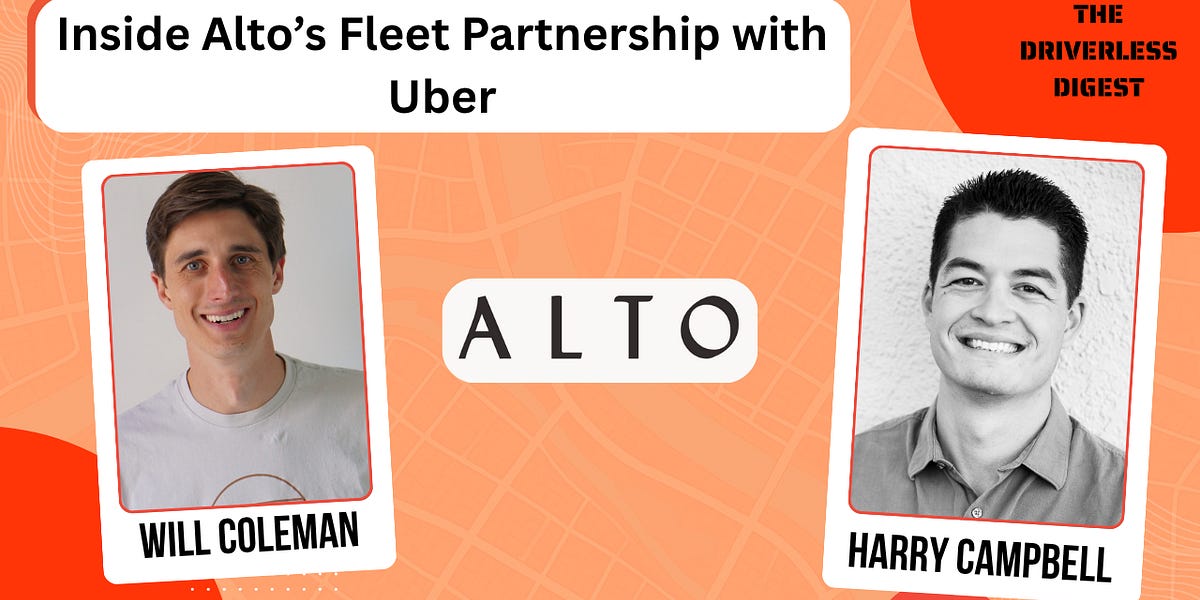- The Rideshare Guy
- Posts
- Inside Alto’s Fleet Partnership with Uber
Inside Alto’s Fleet Partnership with Uber
🚗 Drive with Purpose: Help Those Who Need Transportation Most
Make a real difference while earning flexible income as an NEMT driver
Wingz connects drivers with patients who need reliable transportation to medical appointments - people with limited mobility, no transportation options, or both. It's meaningful work that can't be replaced by autonomous vehicles.
What makes Wingz special:
✓ Three service levels - curb-to-curb, door-to-door, or hand-to-hand assistance
✓ Extensive training - CTAA Passenger Assistance, Safety & Sensitivity certification
✓ Stable scheduling - rides booked in advance, build recurring relationships
✓ No tip pressure - it's a necessary service, not a luxury
✓ Future-proof work - NEMT requires human care and won't be automated
Currently hiring in: Georgia, Arkansas, Tennessee, Virginia, and Florida
Unlike Uber/Lyft health rides where you might not know it's medical transport until arrival, Wingz drivers are fully prepared and trained for this specialized service

The Driverless Digest: Inside Alto’s Fleet Partnership with Uber
In this episode, Harry speaks with Will Coleman, CEO and Co-Founder of Alto, an innovative rideshare and delivery service emphasizing safety, hospitality, and consistency. Will discusses Alto’s operations in multiple U.S. cities, their unique business model involving employed drivers and owned vehicles, and their strategic focus on fleet management as a foundation for electric and autonomous mobility.
Most importantly, the conversation delves into Alto’s newest partnership with Uber, the complexities of fleet management, and the differentiation factors contributing to their success, such as lower insurance costs and high service quality. Will also touches on the benefits and challenges of scaling, and shares insights on the future of autonomous vehicles in the rideshare industry.
Listen to The Driverless Digest With Alto CEO Will Coleman
If you like podcasts better, check us out on Apple Podcasts or Spotify! While you’re there, hit subscribe so you don’t miss our latest episodes!
Quick Takeaways
Alto sees fleet-owned rideshare as a strong foundation for an autonomous future, not a competitor to existing platforms.
The Uber partnership allows Alto to expand its reach while maintaining its own vehicles and W2 drivers.
Alto’s model mirrors AV operators like Waymo, combining full vehicle ownership with a focus on consistent ride quality.
Infrastructure is key: Alto has built out charging stations, maintenance hubs, and real-time scheduling systems to support high-efficiency operations.
Insurance costs are lower due to safety protocols, employee training, and reduced risk on the road.
The company believes AVs will need operators like Alto to manage daily logistics and fleet reliability.
Rather than replacing drivers, Alto aims to improve working conditions with guaranteed schedules and fewer cancellations.
AV adoption will be gradual, and Alto is building systems that can support both electric and autonomous vehicles when the time is right.
Will emphasizes that ridesharing doesn’t need to choose between human drivers and autonomous vehicles (AVs); both can work together to serve different trip types.
Long term, Alto wants to be the operational layer that helps AV technology scale smoothly without sacrificing the rider experience.
Alto: https://ridealto.com
Will Coleman's LinkedIn: https://www.linkedin.com/in/will-coleman
RSG179: Redefining Rideshare with Alto
RSG203: An Update on Alto
Harry's Newsletter: The Driverless Digest
Watch The Podcast On YouTube
Watch our YouTube episode to hear Alto’s take on fleet-driven rideshare and how it fits into the future of autonomous vehicles. While you’re there, hit subscribe!

Did someone forward you this newsletter? Subscribe now for free so you never miss an update…
Never miss a Rideshare Guy update…
